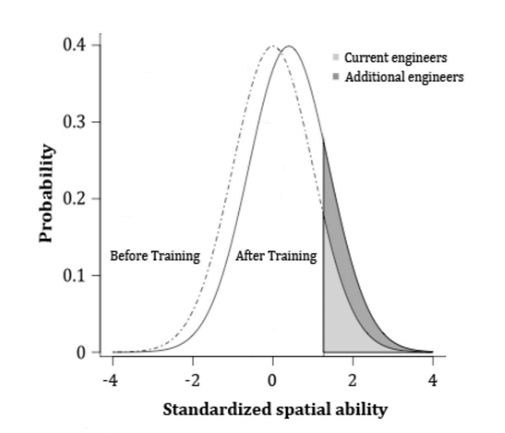But working memory is not the only cognitive process that might be a candidate for training. Spatial skills are a good predictor of success in science, mathematics, and engineering.
Now on the basis of a new meta-analysis (Uttal, Meadow, Tipton, Hand, Alden, Warren & Newcombe, in press) researchers claim that spatial skills are eminently trainable. In fact they claim a quite respectable average effect size of 0.47 (Hedge's g) after training (that's across 217 studies).
Training tasks across these many studies included things like visualizing 2D and 3D objects in a CAD program, acrobatic sports training, and learning to use a laparascope (an angled device used by surgeons). Outcome measures were equally varied, and included standard psychometric measures (like a paper-folding test), tests that demanded imagining oneself in a landscape, and tests that required mentally rotating objects.
Even more impressive:
1) researchers found robust transfer to new tasks
2) researchers found little, if any effect of delay between training and test--the skills don't seem to fade with time, at least for several weeks. (Only four studies included delays of greater than one month.)
This is a long, complex analysis and I won't try to do it justice in a brief blog post. But the marquee finding is big news. What we'd love to see is an intervention that is relatively brief, not terribly difficult to implement, reliably leads to improvement, and transfers to new academic tasks.
That's a tall order, but spatial skills may fill all the requirements.
The figure below (from the paper) is a conjecture--if spatial training were widely implemented, and once scaled up we got the average improvement we see in these studies, how many more people could be trained as engineers?
Uttal, D. H., Meadow, N. G., Tipton, E., Hand, L. L., Alden, A. R., Warren, C., & Newcombe, N.S. (2012, June 4). The Malleability of Spatial Skills: A Meta-Analysis of Training Studies. Psychological Bulletin. Advance online publication. doi: 10.1037/a0028446
Newcombe, N. S. (2010) Picture this: Increasing math and science learning by improving spatial thinking. American Educator, Summer, 29-35, 43.

 RSS Feed
RSS Feed